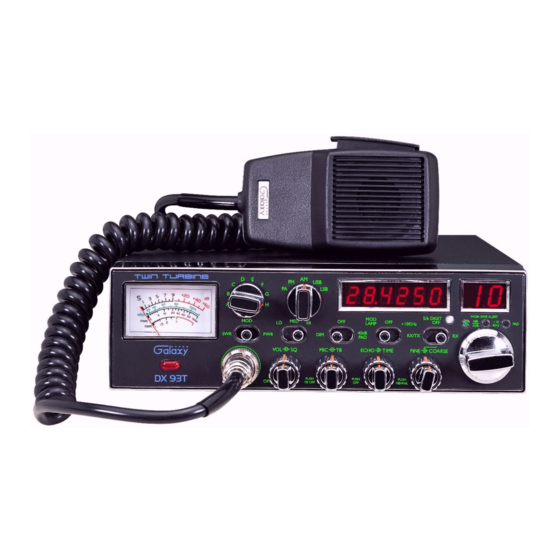Galaxy DX 93T Manual del usuario - Página 3
Navegue en línea o descargue pdf Manual del usuario para Transceptor Galaxy DX 93T. Galaxy DX 93T 11 páginas. 10 meter amateur mobile transceiver with built-in frequency counter & starlite face plate

IGNITION NOISE INTERFERENCE
With weak signals, you may experience interference of the signal by
background noise. This radio has NB and ANL circuits which will help reduce
background noise from sources such as your ignition system. However,
background electrical noise may come from several sources and all noise may not
be eliminated. With extremely weak signals, you can operate this radio with the
engine turned off, which should improve reception. If the ignition noise level is
too high to allow proper operation under most conditions, you should have your
installation of the radio checked by a qualified technician.
ANTENNA
This radio has a jack in the rear for a standard PL-259 antenna plug. If you are
looking for the most range for your transmission, use a vertically polarized,
quarter-wave length antenna. If antenna height is a problem, you may use a
shorter, loaded-type whip antenna although you can expect some loss of
transmission range.
To improve performance, your antenna should be matched to your radio. Your
antenna can be adjusted so that it matches your radio.
EXTERNAL SPEAKER
The external speaker jack (EXT SP.) on the rear panel is used for remote
receiver monitoring. The external speaker should have 8 ohms impedance and be
able to handle at least 4 watts. When the external speaker is plugged in, the
internal speaker is disconnected.
PUBLIC ADDRESS
To use the Public Address (PA) function, first connect an external speaker to
the PA. SP. Jack on the rear of the radio. See the above specifications for a proper
external speaker. Keep the speaker away from the microphone to avoid acoustic
feedback.
- 4 -
CHAPTER 3 OPERATION
CONTROL FUNCTIONS
FRONT PANEL
14
15 16
17 18
T w i n T u r b i n e
D
E
FM
C
F
PA
B
G
S
dB
A
H
M OD
M O D
M ED
LO
PW R
SW R
SW R
PW R
VO L
SQ
DX 93T
O FF
1
2
3
4
1. MOD LAMP: When switched on, this Modulation indicator will illuminate
as you speak into the microphone. When you speak louder, it appears bright
because it is on nearly 100 percent of the time and when you speak softer, it
appears dimmer because it is flickering on and off. It does not glow at all
when there is no modulation. This lamp operates in all modes.
2. SWR/MOD/PWR SWITCH: This switch controls the function of the meter
during the transmit mode. In the "SWR" position, the meter indicates the
Standing Wave Ratio (SWR) of your antenna (accurate only in HI power).
There are no adjustments because the SWR circuit in this radio calibrates
itself automatically. When the switch is in the "MOD" position, the green
scale on the meter indicates your percentage of modulation in the AM mode
only. It is most accurate when testing at maximum power output. When this
switch is in "PWR" position, the meter indicates your power output.
3. MICROPHONE JACK: Used to connect microphone.
4. ON/OFF VOLUME CONTROL: This knob controls the volume and power
to the radio. To turn radio on, rotate the knob clockwise. Turning the knob
further will increase the volume of the receiver.
19
20
21
22
23
AM
U SB
LSB
H I G H SW R ALERT
5/ 6 D I G I T
M O D
O FF
O FF
O FF
H I
LAM P
+10KH z
A N L
40dB
D I M
RX/ TX
RX
PAD
M I C
TB
EC HO
TI M E
FI N E
C O ARSE
PUSH
PUSH
PUSH
TB O FF
O FF
N B/ AN L
5
6
7
8
9
10
11
- 5 -
24
25
N B
+10
PAD
KH z
12
13
